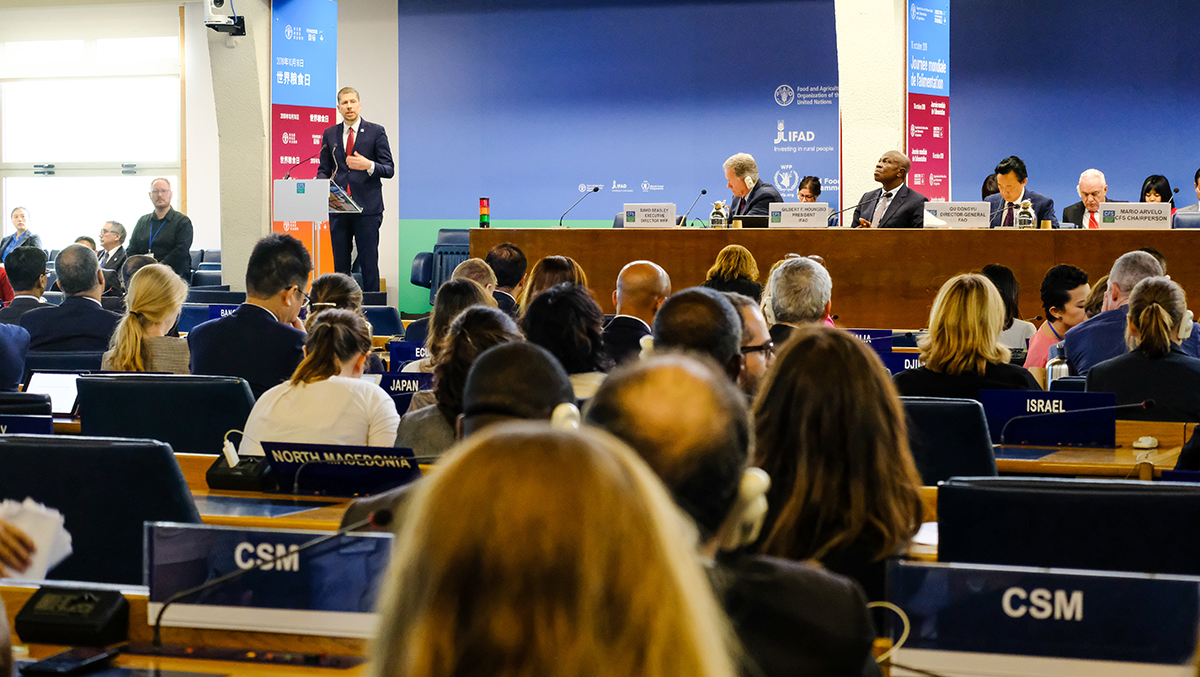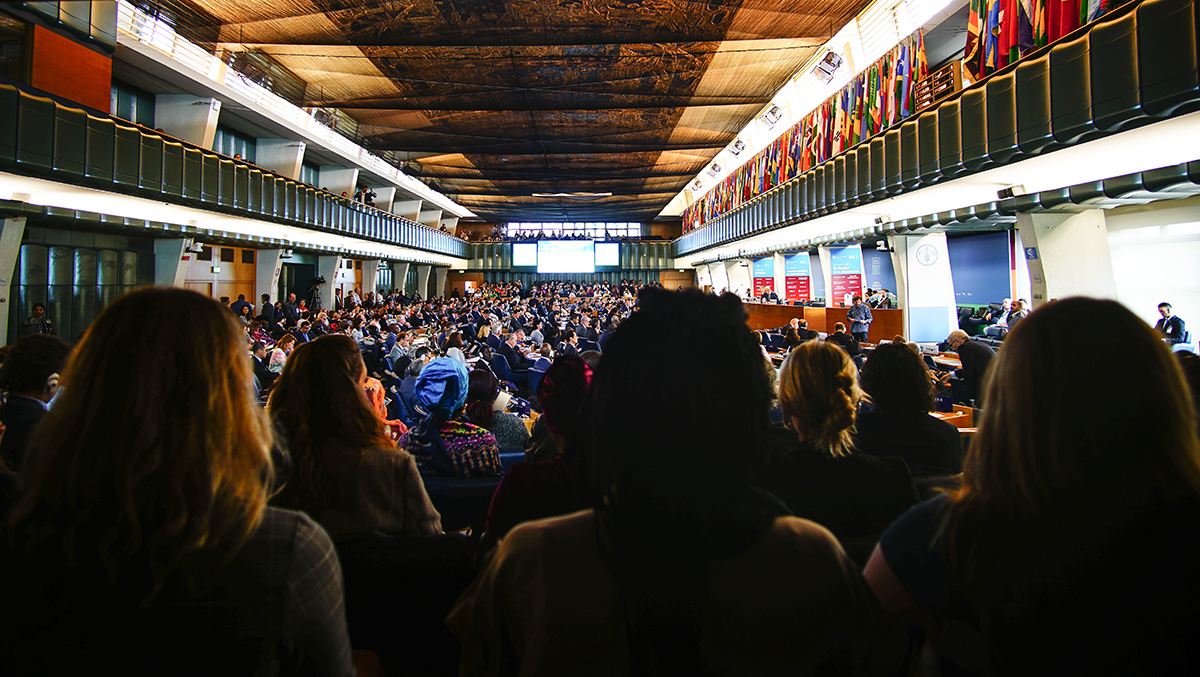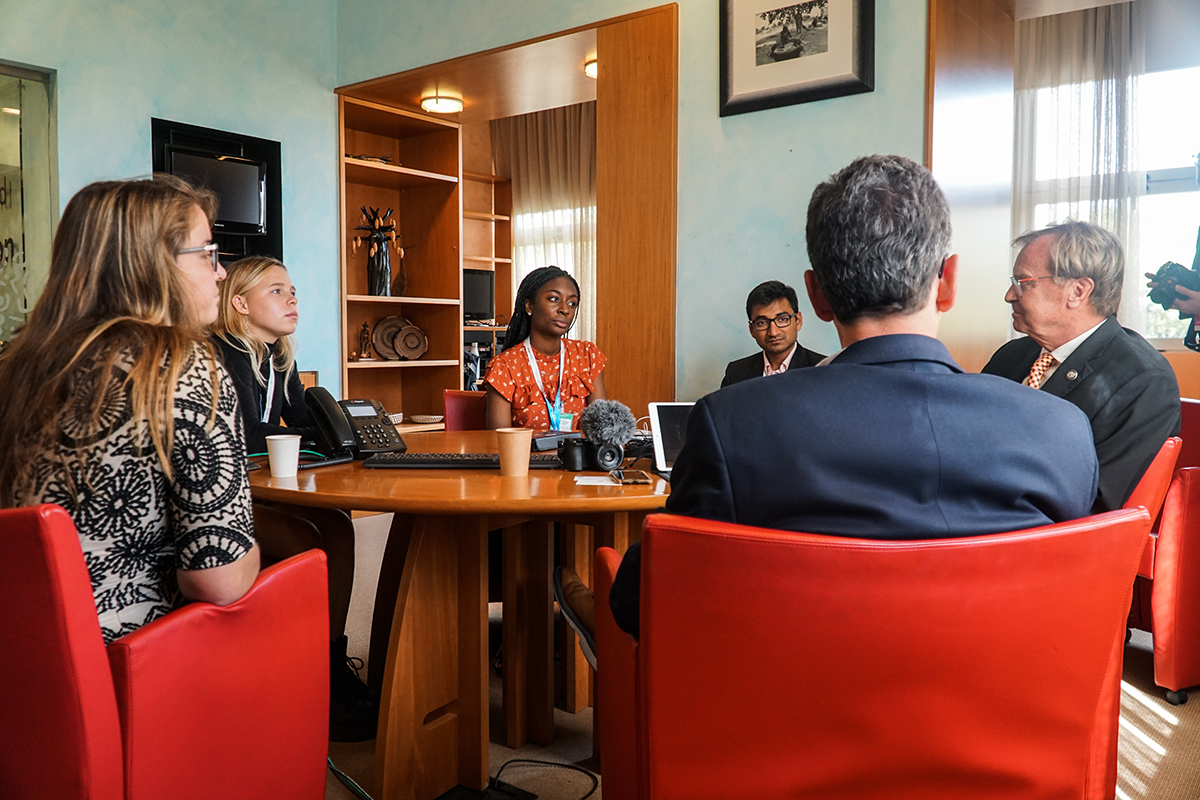
Mario Arvelo, Committee on World Food Security Chair, speaks at the introductory session to kick off day one of CFS 46. (Dan Reed/PlanetForward.org)

Mario Arvelo, Committee on World Food Security Chair, speaks at the introductory session to kick off day one of CFS 46. (Dan Reed/PlanetForward.org)
The cool thing about traveling with people you don’t know is the opportunity to figure out who you really are, or at least who you want to be. You get the chance to realign with your beliefs and opinions about whatever is going on in the world, and when people ask about who you are, and what you want to do with your life, that is your glowing chance. I think of it kind of like a real-life, interactive Instagram or Twitter bio, or better yet, an elevator pitch.
When I embarked on the trip to Rome, Italy, where I would be participating as a delegate with Planet Forward in the 46th Committee on World Food Security (CFS), I knew there was going to be plenty of opportunity for my pitch on a personal and professional level. And before I knew it, there I was, on the first night in Rome with a traditional pasta dish sitting below me on the checkered table-cloth, performing my pitch, and introducing who I was. Why was I there attending the conference on global food security?
It came so naturally, especially as my peer sitting across the table from me claimed climate change could be solved through technology-based solutions. This was a contradiction of everything I believed in as a student that has studied the climate crisis and how we have gotten to where we are in the world today. So, I ran with it.
“Hi, my name is Lindsay, and technology scares me. I don’t believe it holds solutions, I believe it hosts destruction, and in light of development and adapting to climate change, I think it has the potential to further increase the gap between human beings and the earth. My skepticism is not only curious, but it is angry towards technology and its rapid speed. I am here to better understand its role in global development and sustainable agriculture.”
Something along those lines rolled effortlessly off my tongue.
I quickly realized that the following week at the Food and Agriculture Organization (FAO) building was going to be a challenge, especially as I held on tight to my ideas about technology. But as much as I was skeptical of technology-based solutions, I tried my best to remain open to their potential in reducing suffering, feeding the hungry, and contrary to my beliefs, actually bringing us humans closer to the earth.
On the first day of the CFS46 I found myself perched up in the comfortable blue seats of the plenary with my eyes wide, notebook crisp and ready to be filled with notes. Once I figured out what the white thing was on everyone’s ears, I attached mine to my ear with the language set to English, and I was ready to listen.

Nearly 1,900 attendees filled the room. Each one, coming from their corner on the planet; bringing along with them their unique experiences, ideas, and perspectives. From scientists and governments to farmers and members of civil society, the CFS is a multi-stakeholder platform that reports to the United Nations General Assembly about the status of global food security and nutrition for all. That’s what they’re all about; having every voice at the table for creative, inclusive, and effective policy approaches towards positive change.
Within the first few moments of the meeting, chairperson of the CFS, Mario Arvelo, gave the attendees some context and reason for being there with a moment of silence for the millions of people that have died since last year’s meeting as a result of hunger and disease stemming from malnutrition.
This single moment set the tone and motivated the attendees to address world hunger for the estimated 821 million people without access to a nutritious meal. This number loomed heavily throughout the space of the FAO, and deeply contributed to my perspective.

All of my life, I have had access, adequate access — maybe even an overly adequate access — to food. It was in these heavy moments soaked in the unimaginable number of 821 million that my privilege was unveiled. I began to see the importance of accepting the potential of technology, and understanding that food cooperatives, organic farming, and things alike cannot be the only solution. Throughout the week, I was beginning to realize that food insecurity is a far bigger issue than I have been able to imagine within the walls of my college classrooms, from my corner on the planet.
In order to fulfill the U.N. Sustainable development goals for the 2030 agenda, solutions need to be multifaceted with the embrace of technology on the foreground. This, at first was a hard pill to swallow, but with the 821 million people in mind, the pill went down really smoothly.
My questions during my time in the FAO building ultimately became, “Can technological innovation and sustainable agriculture work hand-in-hand? And, can technology actually work to make the gap smaller between humans and the earth?” I carried these with me as I attended a side event called “Innovation and Agroecology.” It was held in the “green room” and as the diverse group of panelists filled the seats on stage, I found my seat near the front, so I wouldn’t miss a thing. The panel was complete with farmers from Argentina, New Mexico, Italy, and Nigeria, along with business owners of agrotechnology companies. When dialogue began, I felt as if my questions were being directly answered.
Agroecology is a farming practice that centers on food production and aims to make the best use of nature’s goods and services while not damaging these resources. Farmers that include agroecology in their practices seek to improve and increase yields for balanced nutrition while simultaneously strengthening the ecosystems and fair markets in place for their products. Typically, agroecology is associated with a more natural and organic approach to agriculture, as its origins are deeply embedded within indigenous knowledge. Needless to say, I was looking forward to what Luciano Loman was going to share as the executive director of Metos Brazil, an agrotechnology company.
He shared about how, through the technology and services Metos provides, farmers can become more in tune with their crops. For example, with the iMETOS® DECISION SUPPORT SYSTEM, farmers can closely monitor the soil parameters and relevant climatic conditions. The data collected through this technology directly increases the yield and decreases the input, whether that’s water, fertilizer, or even physical labor. Essentially, the software speaks for the plant, letting the farmer know what they need, and exactly when they need it.
This insight from Loman highlighted the value and proved to me how beneficial adopting technologies as such can be, especially for farmers working in harsh and unpredictable climates. It was beginning to seem as if technology could actually work to make the gap smaller between humans and the earth.
The gears in my mind were turning, but I was still feeling connected to my old beliefs, especially as I sat in on an interview between Kip Tom, the United States Representative to the U.N. agency for Food & Agriculture, and Frank Sesno, the creator of Planet Forward.
In the conversation, Tom weighed heavily on the end of the technology advocate spectrum — the one that I feared the most — and in response to Sesno’s question about the reality of climate change, the ambassador said, “I think one of the things that we have available to us today is (science), if we are to let science do its work, we can address some of these changes…
“I think this is what we need to look at, the way we can use technology to better leverage our farm, each acre we farm, (and) improve the environment along the way.”
Overall, the conversation held a tone that placed technology on a pedestal, as an end-all-be-all, long-term solution. I was just not buying it and after this interview, I felt as if I had returned to square one with a returned sense of anger and distrust in technology.
But, rest assured, after sharing my skepticism and ideas with Tom, he reminded me of the importance of questioning. Questioning, confusion, skepticism, and sharing: each of these are catalysts for change. They are catalysts for growth. In order to effectively work toward goals such as ending world hunger, they remain extremely valuable.

By no means am I now a person who will advocate for the technological solution first, or believes that it is the only solution. Simply, I can see both sides much better now, and the importance of embracing the many different ideas and experiences of others. Although, I will be the first to say that it wasn’t easy to make this shift. I had to poke some holes through my skeptical shield, and pieces of my identity were definitely checked at the door. This was done so with relief and solutions in mind. Relief and solutions for the 821 million people whose question is not, what will we eat? Rather, it is, will we eat?
As we move forward, searching for solutions in the face of a quickly changing climate, we need to remain mindful of the reality of the situation and be willing to embrace the many forms that solutions come in. Whether it is through organic farming, or through embracing biotechnology and software, lucky for us, that pitch I was talking about earlier can change whenever we want. With that, I hope you challenge your perceptions and beliefs, and you’re not afraid to step outside of the box people may have put you in, or maybe even you, yourself have put you in.